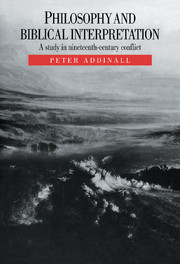Book contents
- Frontmatter
- Contents
- Preface
- Introduction
- 1 The general picture
- 2 David Hume
- 3 William Paley
- 4 Biblical conservatism
- 5 Conservative natural theology: Paley's design argument
- 6 Conservative natural theology: Thomas Chalmers
- 7 Liberal natural theology
- 8 The later nineteenth century
- 9 Immanuel Kant
- 10 Critical philosophy and the Bible
- Conclusion
- Notes
- Bibliography
- Index
- Frontmatter
- Contents
- Preface
- Introduction
- 1 The general picture
- 2 David Hume
- 3 William Paley
- 4 Biblical conservatism
- 5 Conservative natural theology: Paley's design argument
- 6 Conservative natural theology: Thomas Chalmers
- 7 Liberal natural theology
- 8 The later nineteenth century
- 9 Immanuel Kant
- 10 Critical philosophy and the Bible
- Conclusion
- Notes
- Bibliography
- Index
Summary
William Paley exercised a strong influence on religious thought in nineteenth-century Britain, to which even his detractors bear witness. Shelley's comment is well known: ‘For my part, I had rather be damned with Plato and Lord Bacon, than go to heaven with Paley and Malthus.’ To which we may add Mary Shelley's remark, ‘Shelley loved to idealize the real – to gift the mechanism of the material universe with a soul and a voice’, which readily explains his antipathy to arguments based on the machine analogy. Hazlitt made scathing comment on Paley's moral philosophy and refers to his ‘loose casuistry, which is his strong-hold and chief attraction’, but even that derived from Abraham Tucker. In describing a conversation with Coleridge, Hazlitt tells us that ‘He mentioned Paley, praised the naturalness and clearness of his style, but condemned his sentiments, thought him a time-serving casuist, and said that “the fact of his work on Moral and Political Philosophy being made a text-book in our Universities was a disgrace to the national character”.’ Coleridge described the Natural Theology as ‘the utter rejection of all present and living communion with the universal Spirit’ and among several references to Paley in his Aids to Reflection there occur the following:
Hence, I more than fear, the prevailing taste for books of Natural Theology, Physico-Theology, Demonstrations of God from Nature, Evidences of Christianity, and the like. Evidences of Christianity! I am weary of the word. […]
- Type
- Chapter
- Information
- Philosophy and Biblical InterpretationA Study in Nineteenth-Century Conflict, pp. 35 - 55Publisher: Cambridge University PressPrint publication year: 1991



